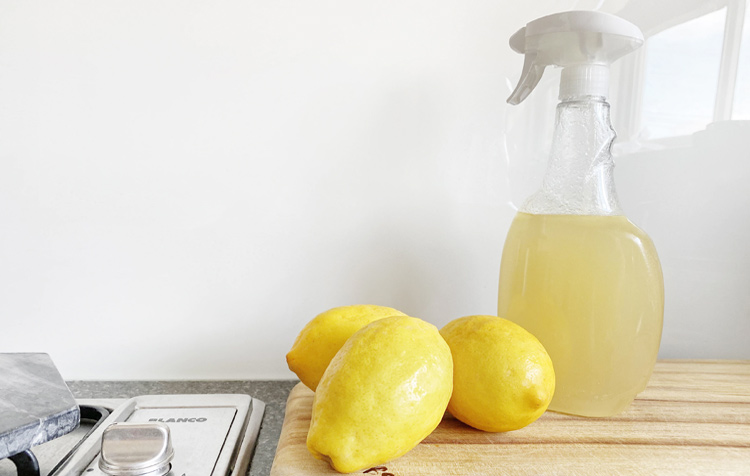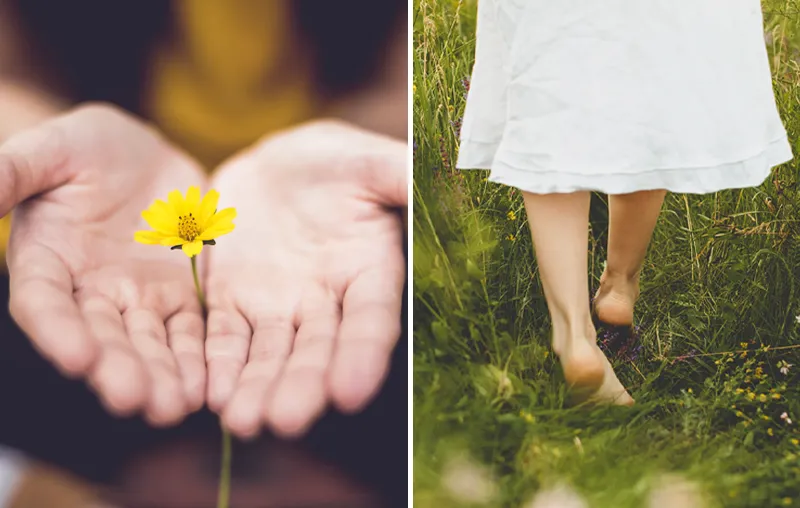Want to learn more about zero waste cleaning and make your home as plastic-free as possible? Then you have a great attitude! There are people who like cleaning - I personally am definitely not one of them. But whether glass cleaner, oven cleaner, cleaning sponges or scouring milk - the high chemical content and all the plastic waste bothers me. Of course, this can also be done in a more environmentally friendly and sustainable way! Fortunately, we have a cornucopia of options in the household to produce significantly less or even no more waste.
In this article I would like to give you now the most valuable tips for cleaning and cleaning in the sense of the Zero Waste Lifestyle from cleaning products to helpful items. Use them to clean up your home quickly, naturally, waste-free and inexpensively. Let's go!
- Make yourself aware of why!
- Use reusable wipes
- Try a few, but versatile home remedies
- Make your own cleaning products
- Set on reusable cleaning utensils
- Prefer bar soaps for the right purpose
- Also take care of your cleaning utensils
- Use ecological garbage bags
- Get a long lasting vacuum cleaner
- Choose all your utensils wisely
1. make yourself aware of why!
We clean our home, for example, to prevent the proliferation of bacteria or household accidentsto prevent allergies or simply to brighten our mood. Ultimately, cleaning improves our well-being and our health. Not everyone feels this during the cleaning routine, but definitely afterwards 🙂
But by using chemical cleaning agents, we also constantly flush vast quantities of chemicals into the groundwater via wastewater - the endangers the environment and our health. In addition, there is all the waste from plastic bottles and packaging, which often cannot be recycled at all or only in a very costly and energy-intensive way. Finally, harsh, chemical cleaners also contribute to many of the biggest environmental problems of our time with. But a clean home should not be based on the expense of the environment and our health.
So far, only twelve percent of Germans pay attention to environmentally compatible cleaning products when buying them. The above reasons should permanently motivate you to make sure that this statistical value continues to grow in the future.
2. use reusable wipes
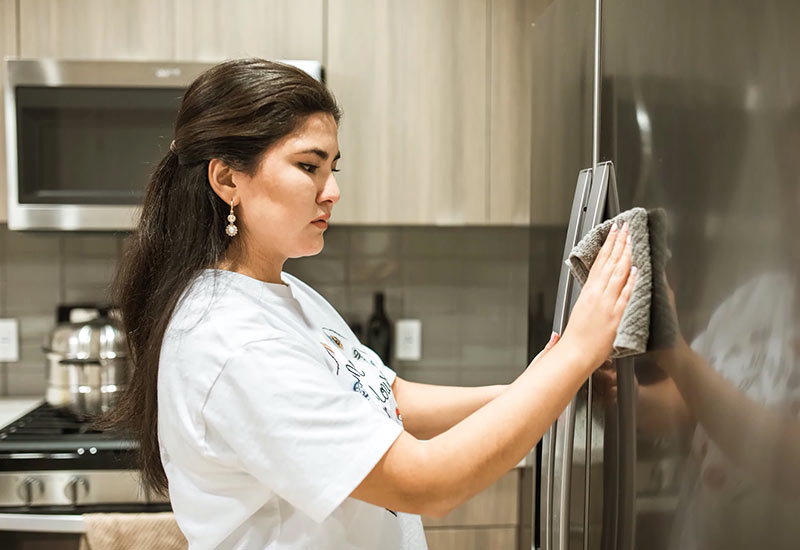
On average, every German consumes about 18 to 19 kilograms of kitchen roll paper. Although it is very convenient, but steadily consumes the natural resource wood and ends up in the trash immediately after the short application.₁
Instead, prefer to use washable, reusable Cloth or cellulose cleaning cloths. They are biodegradable and last a long time. You can rinse the so-called Swedish cloths or simply throw them in the washing machine and use them for months if you handle them well. Also Microfiber cloths are washable, last a very long time and clean extremely effectively. Finally, by replacing disposable products with reusable products, you can also Save money sustainably.
Tip: Also for drying you can use forever reusable cloth towels. Ideally, you cut them from old T-shirts, towels or sheets and recycle them once again.
3. try few but versatile home remedies
There are a few classic home remedies that will give you save the purchase of many, expensive, different cleaning products will be. Of course, there may be a bit of plastic waste here and there - but basically you save a lot of packaging, chemicals and money!
Here are some natural home remedies for inspiration that should help you:
- Curd soap (e.g. against stubborn stains on surfaces or in clothing).
- Citrus (e.g. orange and lemon peels against lime deposits)
- Citric acid (e.g. as a descaling agent, fabric softener or pot cleaner).
- Washing soda (e.g. against clogged drains or as a toilet and upholstery cleaner).
- Vinegar/vinegar essence (e.g. as descaling or to remove fly dirt).
- Baking soda (e.g. as window, drain and toilet cleaner or odor remover).
- Coconut oil (e.g. for removing stickers or as furniture polish).
- Fresh air (e.g. for the removal of unpleasant rumors)
Important: Please do not throw away anything you already have. Use up the respective cleaning agent so that it was not produced in vain. Simply make your cleaning routine calmly but steadily more plastic-free.
4. make your own cleaning products
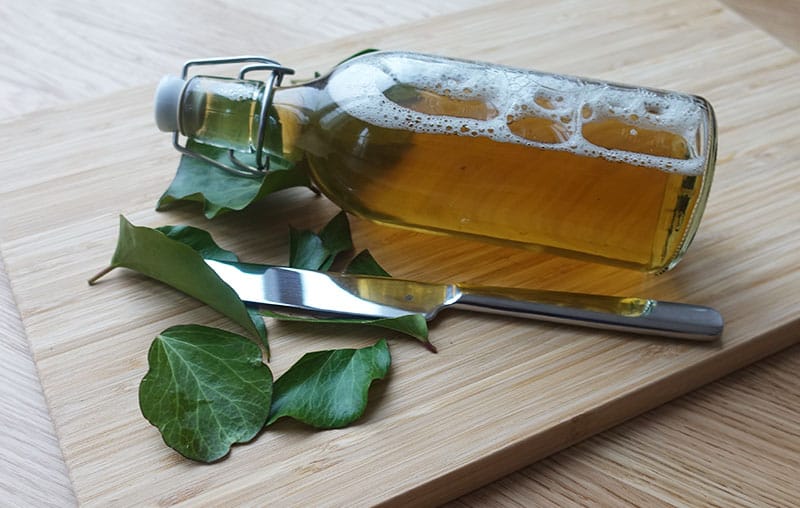
If you've been following me for any length of time, you know that it's a lot easier to plastic free living lets when you make everyday utensils yourself and have full control over the ingredients. Here are some cleaning utensils that are relatively uncomplicated and can be made yourself from natural ingredients:
- Dishwashing liquid: You can whip up a foaming dishwashing liquid from ivy leaves in just a few minutes. At Ivy dishwashing liquid make yourself you will find out how it works!
- Glass Cleaner: From citrus peels, baking soda and vinegar can be made a really effective Make your own glass cleaner. In the linked article you will learn how easy it is.
- Oven Cleaner: From sodium bicarbonate, table salt and vinegar you can make a Own creation brand oven cleaner do. In the linked article you can see what you need to do.
- …
There really are an incredible number of DIY ways to make zero waste cleaning even easier for you. If you're looking for quick solutions, the following are also suitable plastic free packed tabswhich you dissolve in water in the spray or glass bottle and then use as the cleaning agent for which the particular tab is intended.
5. set on reusable cleaning utensils
From experience, waste prevention works great when you replace disposable items with reusable alternatives. For example, use a Mop with removable fabric headinstead of disposable Swiffer pads. The latter are namely garbage immediately after use.
Sink brushes made of wood with interchangeable heads are also eternally usable and, if handled well, will not produce waste for ages. Wood and metal broom and dustpan, glass spray bottles, galvanized buckets, as well as versatile canning jars are other useful utensils for cleaning.
6. prefer bar soaps for the right purpose
Curd soap or Aleppo soap - any solid soap serves its purpose. For example, remove Grease and dirt from dishes, pots and pans or let a battered wooden floor shine again in combination with some olive oil. Bar soaps are usually available plastic-free and so incredibly versatile in the home.
Tip: In another article I will introduce you to some of the best applications for curd soap in the home before.
7. also take care of your cleaning utensils
The items that assist you in zero waste cleaning also need to be cared for so that they serve you well for as long as possible. For example, you should regularly wash cloths, the cloth attachment of your mop, or sponges in the Washing machine throw. However, since experience has shown that cleaning materials are very rich in bacteria after use, you should not wash them in one wash cycle with your clothes.
Furthermore, it helps with many cleaning utensils, they with vinegar and water in the sink to soak to clean them properly.
Notice: Don't forget the larger appliances like the vacuum cleaner canister and filter. The better you handle your appliances, the less waste you'll end up with.
8. use ecological garbage bags
Of course, it's impossible to completely avoid creating waste. That's why cleaning as plastic-free as possible also means that you should Separate waste correctly and biodegradable garbage bags or garbage bags made from recycled material you use. Personally, I only use one for organic waste. homemade paper bag. Otherwise, I have said goodbye to garbage bags as far as possible.
9. get a durable vacuum cleaner
Brooms and hand brushes don't get rid of everything, of course. The more durable your vacuum cleaner is, the less often trash is created and the less natural resources are necessary for your cleaning routine. Prefer a energy efficient device that has a reusable filter. You can wash it out in the dishwasher, for example. But also remember to check and clean your vacuum cleaner regularly, so that it lives as long as possible.
10. choose your utensils wisely
If a new purchase is unavoidable, then you should at least take a closer look. Environmental seals like the "Blue Angel" or the "EU Ecolabel" help you to quickly identify the appropriate products. We recommend cleaning products that are refillable or available as Refill are available. This saves you a lot of plastic waste.
Also pay attention to the Origin, natural citations, organic certification and that it is animal suffering free vegan and, palm oil free and fairly produced. was. Ideally, the manufacturer also consciously saves on packaging waste or makes its packaging from natural and recycled material in order to Avoid plastic waste.
Tip: About sustainable laundry I have written you a separate post with valuable tips. Have a look at it!
Zero Waste Cleaning - Doing a lot with just a few resources!
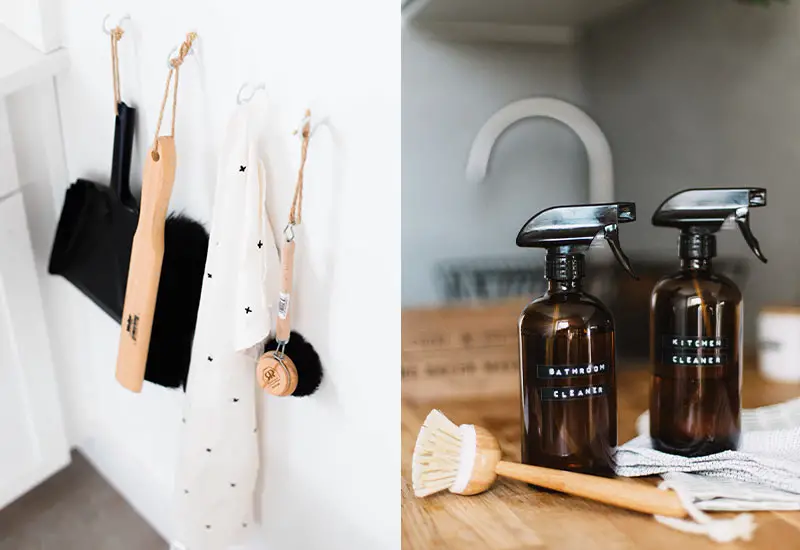
Whether it's an extensive spring cleaning or a weekly cleaning routine, it's possible to make (almost) no waste - and to achieve great things with the cheapest, most natural and least expensive means possible! It's important to know why this is so important and what means can be used to achieve this goal. Reusable alternatives, DIY cleaning products and durable appliances will definitely help you achieve this!
I hope that I was able to help you with this article on zero waste cleaning. Do you have any questions, tips or suggestions? Then I look forward to your comment under this post.
Stay clean,

PS.: Do you already know how you want your Bathroom design without plastic? Then read the corresponding article next. In the article Zero Waste Tips you'll also get even more inspiration for a waste-free everyday life. Good luck!
References:
₁ Federal Environment Agency: Paper tissues, hygiene papers (as of 07.01.2016), available at https://www.umweltbundesamt.de/umwelttipps-fuer-den-alltag/haushalt-wohnen/papiertaschentuecher-hygienepapiere. [16.05.2022].

